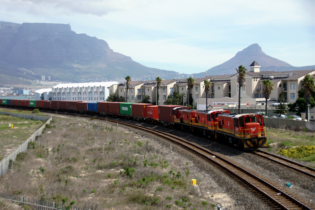With the continuing economic crisis in Europe, South Africa’s shipping industry is taking strain. So says Safmarine’s CEO, Grant Daly. This, the high cost of oil and the growing piracy scourge, has cost the global shipping trade more than $9bn a year. Daly, who was recently appointed CEO of the shipping line, told Transport World Africa that the European crisis had a “significant” effect on the local shipping industry.
“Shipping is about the transportation of goods and, if economies are under pressure, you are likely to see a lesser amount of goods being transported. We went through a rough time in 2009 and again in 2011. At the moment, demand for shipping is inconsistent. This is not good for business and cost efficiencies,” Daly said. Adding to the shipping industry’s woes, operating costs have increased since 2005, especially the cost of oil. At the same time, pricing has declined as competitors scramble for what business is available. In fact, to ship a container now costs less than it did in 2005. Then there is the new scourge of modern-day piracy, which is a significant problem. This has a direct effect on the cost of transporting goods, especially to East Africa. “Obviously our primary concern is our ship’s crew. While the financial impacts are a secondary concern these are nonetheless significant. One of these impacts is that ships have to take longer routes, which has a direct impact on costs. There is also an impact on humanitarian aid with relief cargo not being able to get through. As a company, piracy is something we monitor very closely and we engage with authorities to review policies and strategies on a regular basis. It is not something we as an industry think we can change. It really requires international collaboration and land-based solutions,” Mr Daly said.Last month, Ms Lindiwe Sisulu, South Africa’s Minister of Defence, said foreign security services may need to be allowed into Africa’s territorial waters, and harbours, to protect merchant vessels against piracy. She said navy chiefs in the region would have to debate the ethics, viability and desirability of having armed units in local waters to guard against piracy.
According to figures released last week in the International Maritime Bureau’s global piracy report, 102 incidents of piracy and armed robbery have been reported for the first quarter of this year, with “dangerously” increasing numbers in West African waters. Ten reports of piracy were received from Nigeria in the first quarter, equalling the same number reported in Nigeria for the whole of last year. Somalia continued to dominate with 43 attacks, including the hijacking of nine vessels and taking 144 crew members hostage. Pottengal Mukundan, director of the International Maritime Bureau’s piracy reporting centre, said last week that Nigerian piracy was “increasing in incidence and extending in range. At least six of the 11 reported incidents in Nigeria occurred at distances greater than 70 nautical miles from the coast, which suggests that fishing vessels are being used as mother ships to attack shipping further afield,” said Mr Mukundan. On the east coast of Africa, pirates are beginning to move southwards, reaching down as far as the Mozambique Channel. If allowed to continue unhindered, South Africa’s east coast could become a lucrative hunting ground for pirates.






